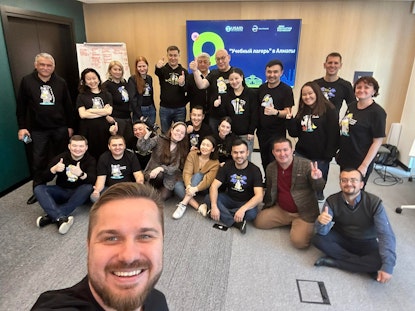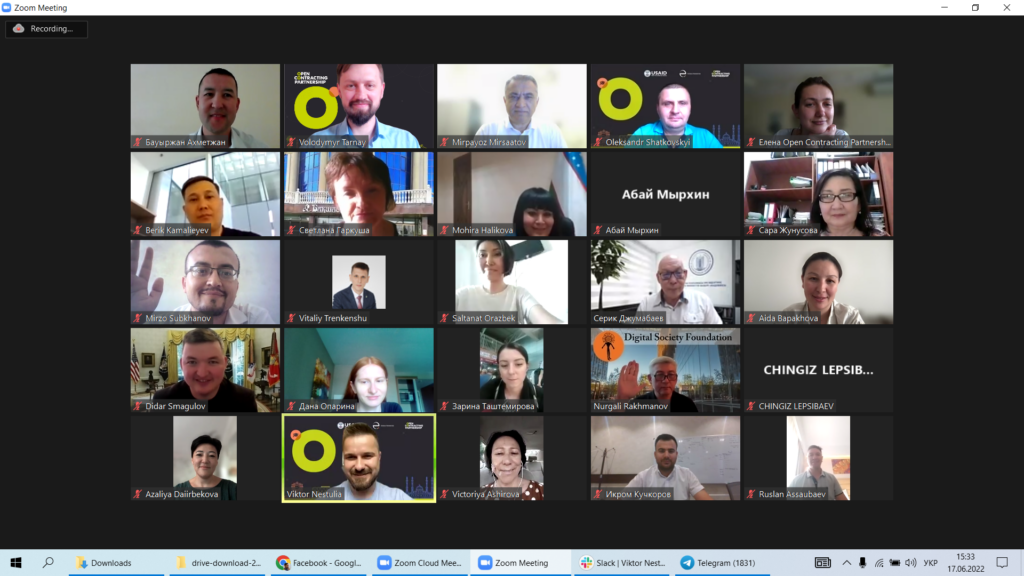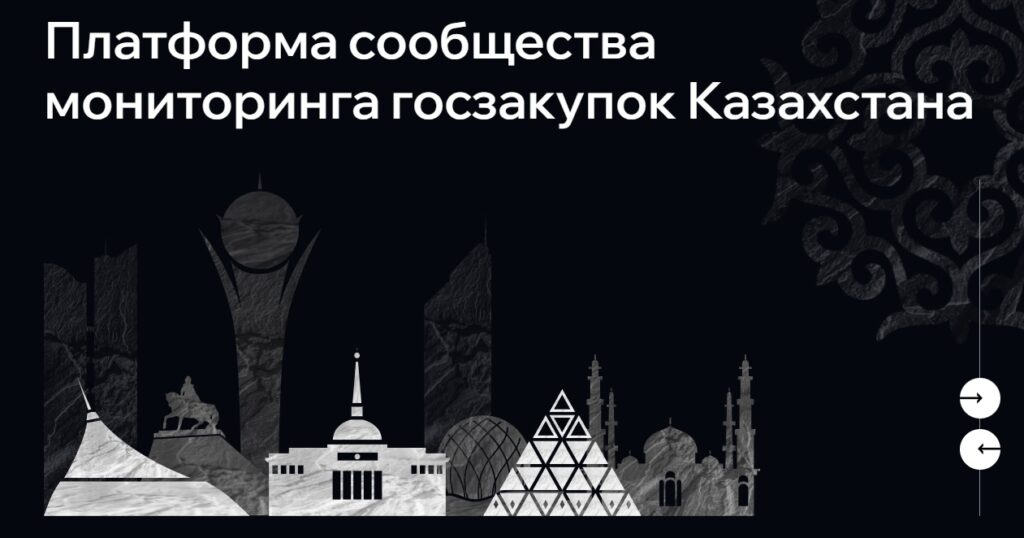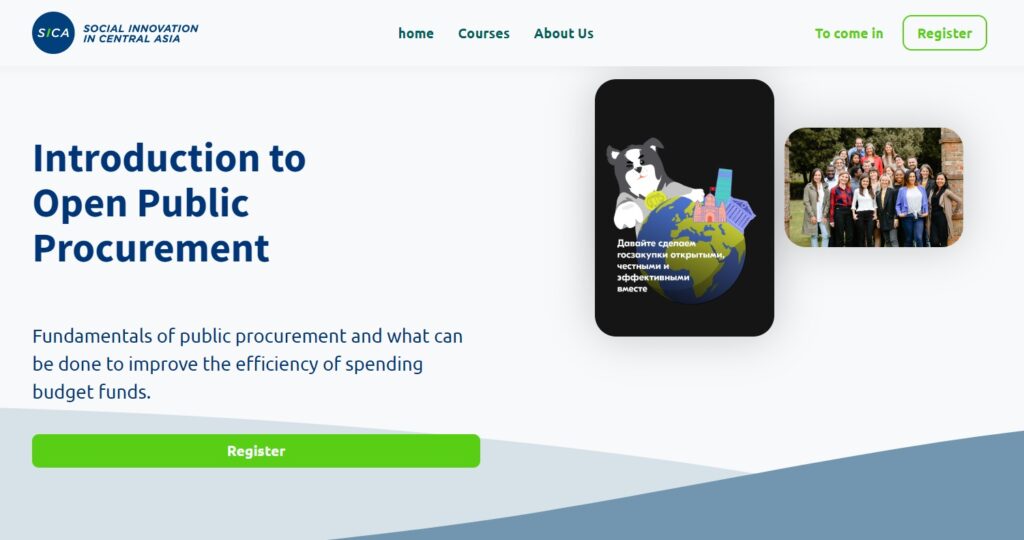Meet Central Asia’s master procurement monitors

How the School of Applied Research in Public Procurement trained community leaders to dig into government contracting issues in Kazakhstan, Tajikistan and Uzbekistan.
An active community of procurement monitors is emerging in Central Asia, following a year-long course that trained leaders from various fields to examine government contracting in the region. More than 80 representatives of civil society, businesspeople, researchers, activists, lawyers and journalists from three countries took part in the School of Applied Research in Public Procurement, an initiative of the Eurasia Foundation’s Social Innovation in Central Asia program, supported by USAID Central Asia and the Open Contracting Partnership.
The three-stage course, which lasted from October 2021 to November 2022, and the coalition that formed from it, have produced dozens of evidence-based insights and recommendations for improving public procurement in Central Asia, from preventing the dumping of hazardous medical waste, to constructing high-quality sports facilities for children in rural areas, and using competitive tenders to cut spending. It inspired the creation of a free self-guided e-course on Open Contracting Basics too.
The program holds valuable lessons for others working to empower contracting monitors with different skills and backgrounds to work closely together to foster transparency and better procurement practices in their regions.
Introductory course
The School of Applied Research in Public Procurement sought to develop participants’ skills in monitoring, research, policy analysis, and promoting public procurement reforms and open contracting in Central Asia, with a vision to improve transparency, accountability and efficiency in the use of public funds.
The first phase, Introductory Course on Public Procurement, took place online from October to December 2021. It consisted of 20 meetings with international experts, politicians, buyers and analysts (recordings available in Russian). The lectures and interactive sessions covered the foundations of modern public procurement, basic skills for monitoring and analyzing the level of transparency and quality of procurement, as well as practical exercises to apply these skills. As a graduation task, students prepared articles about the problems and opportunities in public procurement in their countries.
After completing the Introductory Course, it became clear that the participants were not only interested in gaining knowledge, they wanted to put it into practice: to monitor, research and advocate for transparency in public procurement and promote the efficient use of public funds.
So OCP supported Vitaliy Trenkenshu and his Datanomix team to prepare for the prestigious World Commerce & Contracting Innovation & Excellence Awards in 2021. Their project, a tool to help state auditors detect corruption risks, won first prize in the EMEA region and first prize in the category “Operative improvement”.
Another graduate of the School, Serik Zhumabaev, integrated some of the materials developed for the School of Applied Research into the curriculum of Kazakhstan’s Academy of Public Administration. On April 24 2022 Serik organized a public event in the Academy highlighting approaches promoting interaction between government institutions and civil society in procurement.
An article published in Kazakhstan by Gulbarshyn Karabalina and Svetlana Garkusha prompted the social services department of the Mangystau Region to use a competitive tender for the first time in years.
The team from Uzbekistan wrote an article examining contracts for the Shanghai Cooperation Organisation Summit, a major international event held in the ancient city of Samarkand, and sent appeals to the Anti-Corruption Agency and the Antimonopoly Committee to verify the facts they discovered in the course of their research.

Advanced course
The second stage, the Advanced Course, was originally conceived for more experienced activists and public procurement and financial policy practitioners, as well as the top graduates of the Introductory Course. But thanks to the hard work of the participants and their close cooperation with mentors, the intake of the second course surpassed the first. Held online from March to June 2022, the advanced course also consisted of lectures and interactive sessions on more specialized topics: “Monitoring”, “Research” and “Advocacy”, which participants could choose as an elective.
As a graduation task, the participants prepared dozens of research projects, advocacy briefs and public procurement monitoring in their regions, on topics that included creating a competency matrix to assist government agencies in hiring skilled procurement professionals, dumping of hazardous medical waste, and violations in the construction of sports facilities for children in rural areas (see the above links for all graduate projects).
From theory to practice
A participant from Kazakhstan, Nurgali Rachmaninov, who heads the Digital Society foundation, worked on a research brief about the lack of transparency in a program to overhaul public housing in Kazakhstan. Rachmaninov went on to organize his own distance learning course for experts and activists in September 2022, with a mini-grant from the School. The program was run in collaboration with a group of teachers from the Institute for Advanced Studies at the Almaty University of Energy and Communications, with the support of the Eurasia Foundation, based on the methodology of the School of Applied Research on Public Procurement.

Course graduate Mirzo Subkhanov uncovered a $150,000 fraud in Uzbekistan. Subkhanov discovered more than 300 government agencies had recently purchased a book by the President of Uzbekistan that cost more than $650 a copy.

“Monitoring of public procurement is one of the main tools in the fight against corruption. This is especially true for Uzbekistan, where the level of corruption is still very high,” says Subkhanov.
“Unfortunately, many people do not know about the potential of monitoring public procurement tenders. Thanks to the training I received, I have improved my skills in tracking the distribution of the state budget and identifying potential cases of corruption.”
OCP inspired and helped one of the School participants, Vitaliy Trenkenshu and his Datanomix team, to prepare and submit applications for international competitions: World Procurement Awards (London, June 15, 2022), where they were finalists in the category “Technological Innovation Awards”; and World Justice Challenge (Netherlands, April 30, 2022), where they were section finalists in “Fighting Corruption and Open Government”. OCP also helped Datanomix to tell their story to a wider audience with a feature article in the Kazakhstan edition of Forbes magazine.
Other teams had their work published in national and local media on the following topics:
- Gender equality in procurement
- Assessing the impact of competition on the price of interchangeable goods
- Social programs in the West Kazakhstan region. Are the goals being achieved?
- Purchasing of social services from NGOs of the Turkestan region for 2021-2022
- Public procurement and energy efficiency in the heating of public utilities
- Public procurement conducted outside the official procurement portal
- How to swap officials’ expensive cars for budget cars
BootCamp – a new generation of government procurement monitors
The final stage of the training was the BootCamp for the top graduates of the School of Applied Research. This stage took place offline. Twenty School participants and mentors devoted three days in Almaty to training and networking, as well as getting acquainted with a public procurement business intelligence tool, which was developed by the Open Contracting Partnership team.
BootCamp participants discussed public procurement in Central Asian countries, presented their projects and learned how to use new tools. They passed all three stages of training at the School of Applied Research and now they can rightfully be considered masters of public procurement. Now the graduates are working on forming a coalition to ensure the transparency of public procurement. This idea arose from the participants themselves during the training, and the organizers were happy to support it.
The coalition is already helping to stop many violations in public purchases and working on initiatives to improve legislation and prevent mismanagement in procurement. Working collectively will only strengthen the potential of each of the participants and the organizations they represent.

Open Contracting Partnership supervised the development of a procurement monitoring community platform in Kazakhstan that will serve as a central repository for the efforts and knowledge of the community. Launched in July 2023, the platform will be a one-stop-shop for self-learning for those who want to start and deepen their journey in the field of public procurement monitoring. A unique feature of the platform is the Legal Navigator, which includes a description of all stakeholders involved in the public procurement ecosystem, phases of public procurement in Kazakhstan, and most common violations of procurement law and procurement risks. It clearly delineates the key functions and legislation related to the given stakeholder or procurement phase and is illustrated with the case studies of relevant violations. All violations are accompanied by the appeal template (see example) addressed to the relevant control institution. It provides a unique opportunity to understand and replicate procurement monitoring practices and meaningfully contribute to the development of community knowledge. Advocacy resources are another important feature of the platform, including the community’s advocacy priorities, theory of change, key elements of the changes needed, and organizations that are committed to participating in the advocacy process, bringing clarity to all stakeholders.

MOOC Course on the SICA educational platform
Based on the School of Applied Research in Public Procurement program, Open Contracting Partnership produced a MOOC Course “Open Contracting Basics”, which was deployed on the Social Innovation in Central Asia educational platform so new members of the coalition could learn and benefit from it.
We are sure that a strong, capable civil society will play an important role in the ongoing reforms in Central Asia to make public procurement more open, fair and efficient.